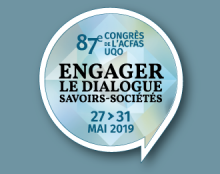Urban
Resilience
Governance
ACFAS 2019 — Participation of the Cité-ID at the Symposiums
2019 Congress of ACFAS
This year, Cité-ID LivingLab will take part in two symposiums in social sciences and multisectorial as part of the ACFAS 2019 Congress.
The conference “Design, Implementation and Governance of Public Resilience Policies” organized by Marie-Christine Therrien (ENAP), Julie-Maude Normandin (ENAP) and Geneviève Baril (ENAP) will be held on May 30, 2019.
This colloquium aims to reflect on the development and implementation of public policies aimed at increasing the resilience of communities to crises through analyzes of the design, implementation and governance of these policies. This symposium also seeks to identify the challenges, problems and solutions experienced by public organizations to increase the resilience of communities at the local, municipal, regional, provincial or national levels. Finally, this symposium aims to discuss the future evolution of these policies.
If you wish to participate, please send your proposal to julie.maude-normandin@enap.ca by March 4, 2019.
For more details, please click on this link.
Also, the symposium “Regional Projects in Adaptation to Climate Change at the Regional Level: Apparitions, Challenges and Outcomes” organized by Alain Létourneau (Université de Sherbrooke), Anthony Voisardd (Université de Sherbrooke) and Geneviève Baril (ENAP) will hold on May 27 and 28, 2019.
This invitation symposium will allow research teams, as well as members of the public, to gain a better understanding of what is currently being done to adapt to climate change at the regional level in Quebec. The symposium will be an opportunity for researchers, for master’s, doctoral or post-doctoral students attached to the various teams, to come and take stock of their concrete approaches in dealing with issues, on the challenges they face. and on the results they started to get. To speak of approaches is to raise the question of methodologies, which sometimes have something flexible; the teams have every interest in knowing more about the methodologies put in play by other teams and also in being able to discuss their ways of obtaining results. The invited teams are in most cases in the heart of their work, it can be expected that challenges will need to be exposed and analyzed in depth. In some cases, results may be reported, but these will mostly be reports of milestones rather than complete reviews of the research conducted.
We are planning two full days. Each intervention will last 30 minutes followed by 15 minutes of exchange. Each day will be completed by a round table review of the day. Specific blocks of work are planned.
For more details, please click on this link.





